The Sports Report Olympics Edition: Learning to love the unexpected
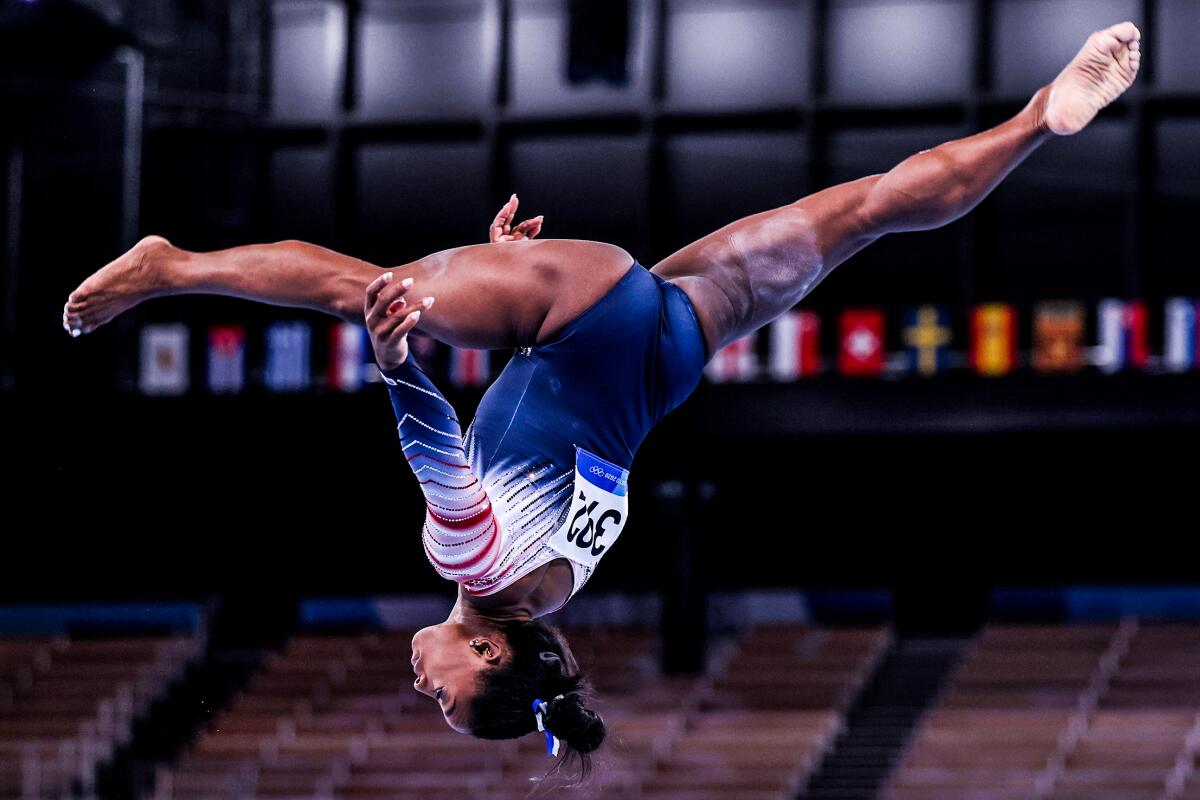
- Share via
SAITAMA, Japan — Good morning everyone, it’s Dan Woike writing to you from a bus outside the Saitama Super Arena, a building that’s half venue, half transformer. More on that in a second, but first here’s what you need to know this morning:
Latest Olympics news and results
Wednesday and Thursday TV schedules
In the build up to these Olympics, veteran editor John Cherwa (who will undoubtedly try to edit the word “veteran” out of this paragraph) told us that the way the Olympics work is that stories you’re not fully expecting will unveil themselves to you along the way.

And he couldn’t have been more right when it came to Simone Biles’ tale over the past week, one about expectations, safety, mental health, pressure — and ultimately — an incredible comeback on the beautifully ironic “balance” beam.
The unexpected has been one of my primary joys while here in and around Tokyo, experiencing a country and an event for the very first time. While the pandemic has obviously changed the dynamic of the trip — “adventuring out” has mostly been defined by trying to order from Uber Eats without using a translation app — exposure to new sports, new athletes and new teams has still made this a special few weeks.
Go beyond the scoreboard
Get the latest on L.A.'s teams in the daily Sports Report newsletter.
You may occasionally receive promotional content from the Los Angeles Times.
Take the Saitama Super Arena, the venue housing basketball where I’ve spent the overwhelming bulk of my time. International basketball rules are definitely different, fouls are much less common, the ball looks a little different and the game is shorter (10 minute quarter from now on, please). But largely, it’s the same game I cover for the Times back in the States — especially with so many NBA and WNBA players competing.
The building itself, though, fascinates me. Instead of having a retractable roof, it has expandable walls — kind of like a camping trailer that can push out into a double-wide. There’s a massive red engine encased on the way to our media seats, and I can’t help but think about what it must look like to see a truly humungous arena expand and contract like an accordion with an ability to almost double its capacity to 36,000 or so fans or cut down to under 10,000.
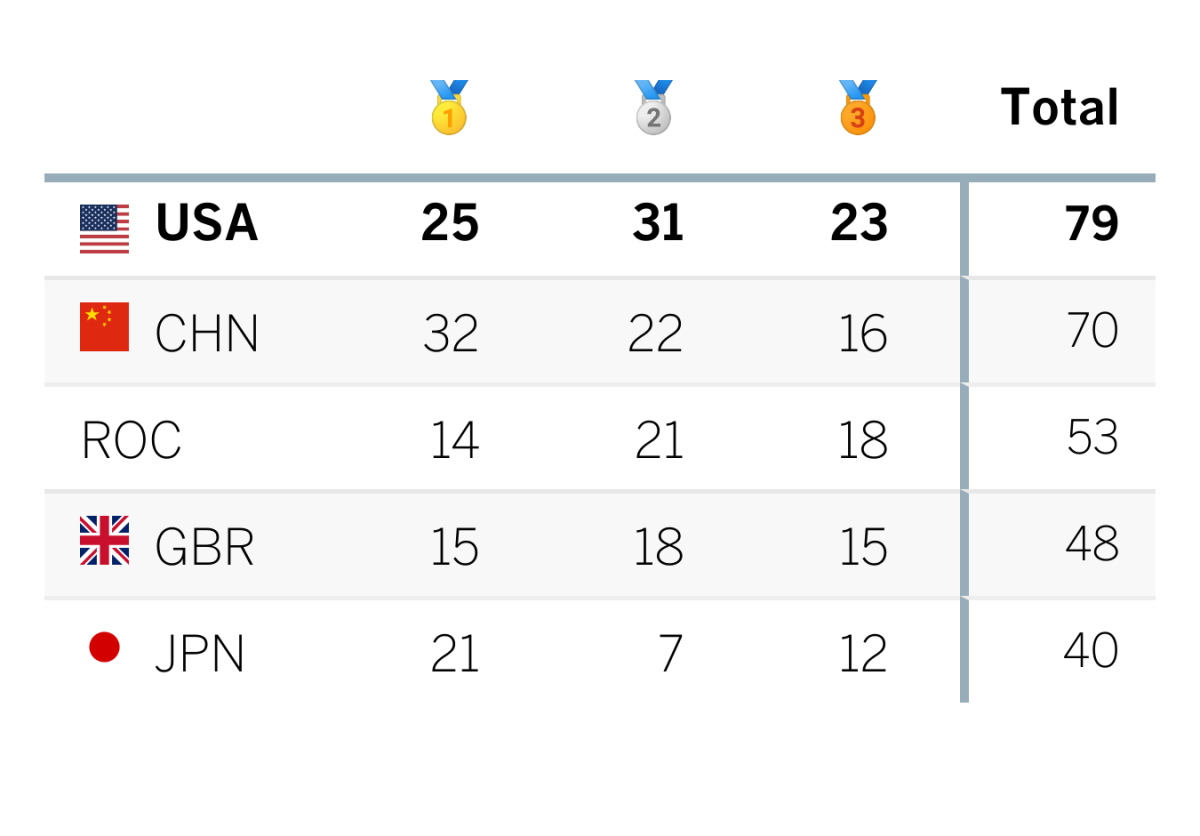
Similarly, sitting inside our offices at the Main Press Center, I got to learn the rules of team handball as I tried my best to officiate an argument between Dylan Hernandez and Jorge Castillo. Same went out at the wrestling and water polo venues, where I tried to study what I was watching closely enough to pick up what the rules were.
And I even learned what a repechage is — a word necessary to understanding the maze that it is the Olympics baseball tournament.
With the semifinals in basketball starting Thursday in Japan, the time for exploring is probably winding down. Maybe I’ll watch speed climbing or equestrian on Japanese television and try to decipher it.
But for me with these Olympics, not fully understanding what I’m seeing (or in some cases eating or drinking) has been as close to a tourist as I’ve been able to be.
Enjoying this newsletter? Consider subscribing to the Los Angeles Times
Your support helps us deliver the news that matters most. Become a subscriber.
Track and field
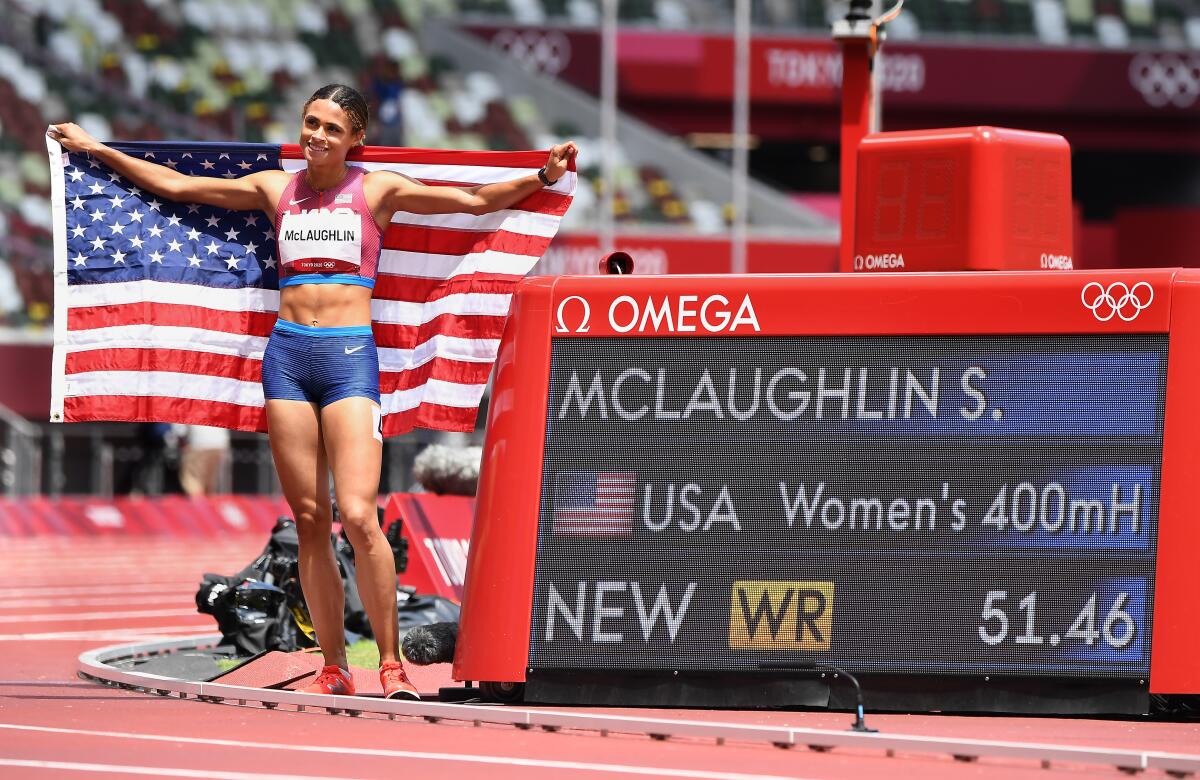
Five years ago, she was a first-time Olympian, a teenager just getting a feel for the international spotlight.
Now Sydney McLaughlin is taking command of the Olympic and global stage.
McLaughlin gave a hint of what was coming in June when she ran a world-record time in the 400-meter hurdles during the U.S. Olympic Trials, a competition that many American athletes regard as a tougher, more-pressure packed event than the Olympics.
On Wednesday, McLaughlin upped the ante.
She won her first gold medal and set a new world record, finishing in 51.46 seconds to edge American Dalilah Muhammad in the second consecutive scintillating 400-meter final of these Games. Teammate Anna Cockrell was disqualified for a lane violation.
“It hasn’t hit me yet,” McLaughlin, who will turn 22 on Saturday, said of winning the gold medal.
Muhammad, 31, also broke the previous world record in 51.58 seconds.
“To come home with silver after breaking a world record, it could be mixed emotions,” Muhammad said. “But right now, I truly don’t feel that way — I’m truly proud of it, and I hope all the people back home are too.”
———
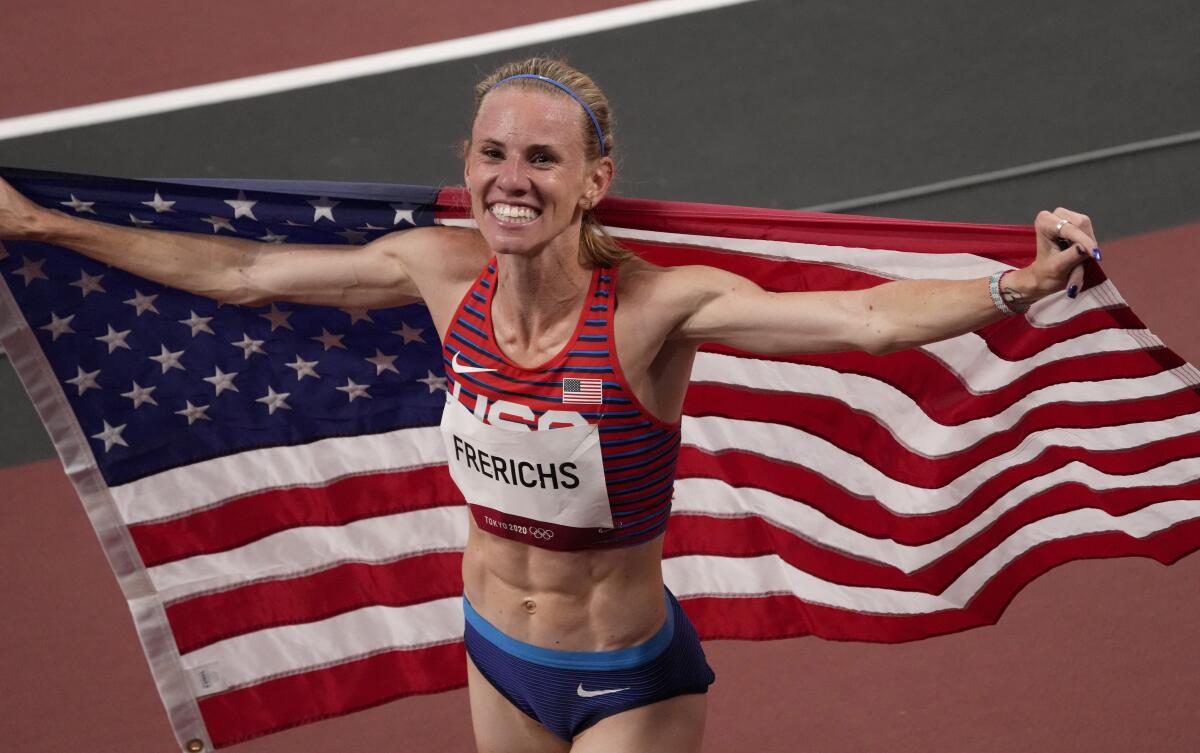
Courtney Frerichs of the United States won the silver medal in the women’s 3,000-meter steeplechase at Olympic Stadium.
Peruth Chemutai of Uganda won the gold medal, finishing in 9 minutes 1.45 seconds. Frerichs finished in 9:04.79 seconds.
“I’m over the moon,” said Frerichs, who opened a big lead for much of the race.
———
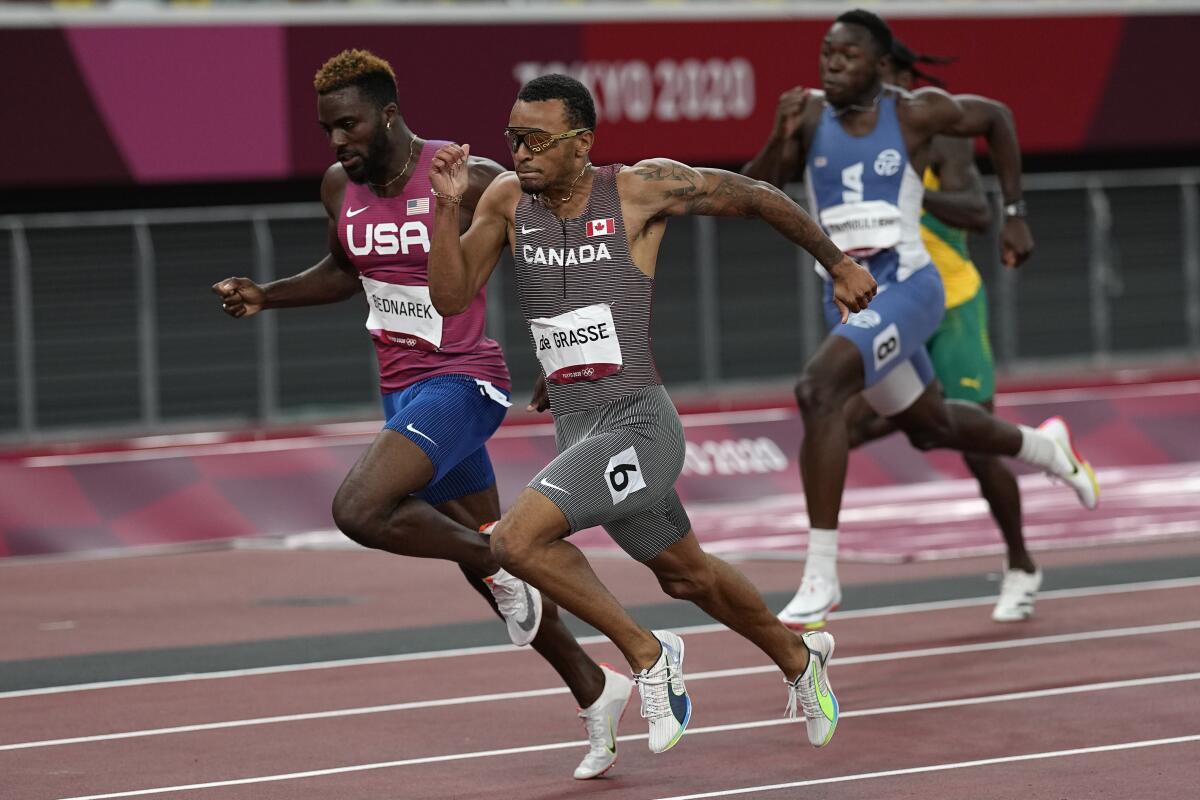
———
Andre De Grasse of Canada won the gold medal in the men’s 200-meter Wednesday night at Olympic Stadium.
De Grasse, who competed for USC in 2015, finished in 19.62 seconds.
Kenneth Bednarek of the United States finished in 19.68 seconds to earn the silver medal. Noah Lyles of the United States finished in 19.74 and earned bronze.
American Erriyon Knighton was fourth in 19.93.
———
Five-time Olympian Allyson Felix finished second in a women’s 400-meters semifinal on Wednesday night at Olympic Stadium to qualify for Friday’s final.
Felix ran in the third semifinal and finished in 49.89 seconds.
Felix has won nine Olympic medals, one shy of the U.S. record held by Carl Lewis.
Women’s basketball
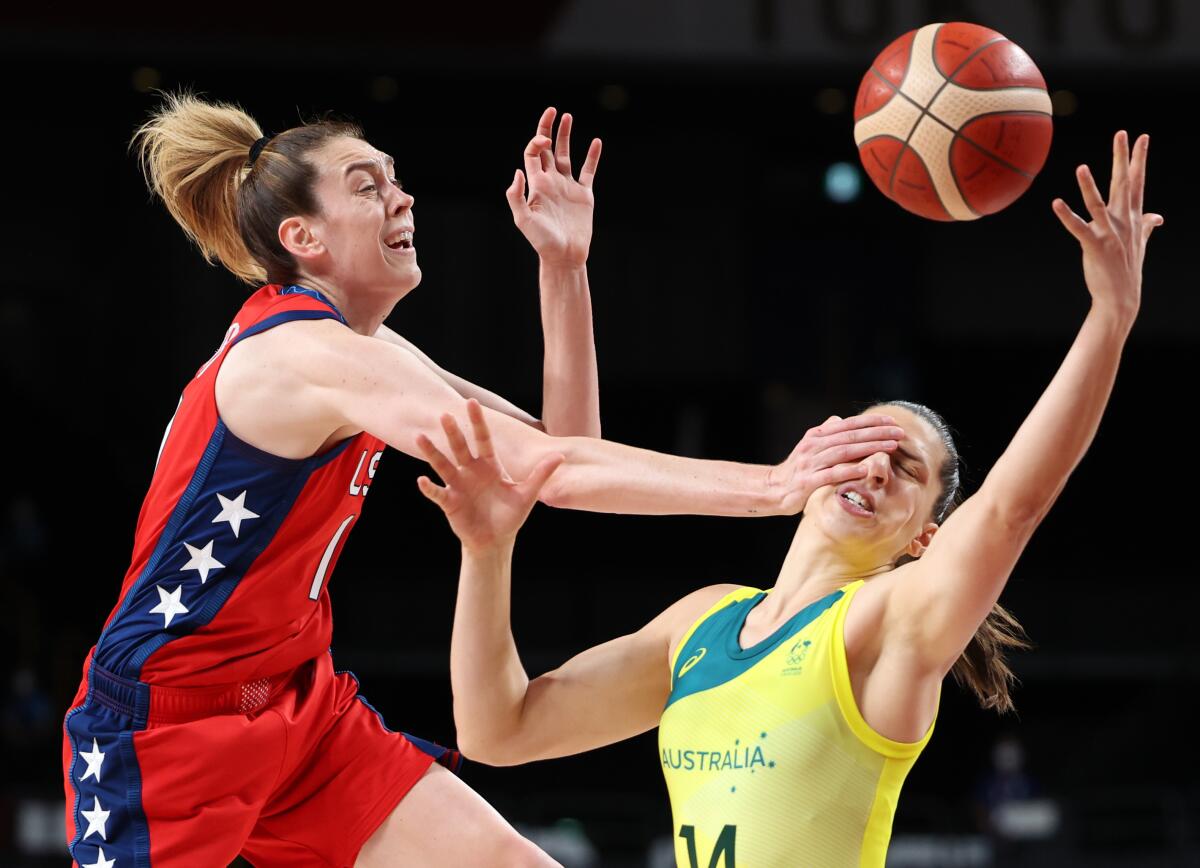
Dan Woike on U.S. women’s basketball: In its final game before heading to Japan, the U.S. women’s basketball team squandered a double-digit lead against the Australian national team before ultimately losing. The game came on the heels of a defeat to the WNBA All-Stars, the first time the U.S. women had lost back-to-back exhibitions since 2011.
After that loss, a frustrated Breanna Stewart said the team had fallen short of the high standard women have set in their program for generations. And the losses, combined with the unknown aftereffects of a physically and mentally draining 2020 WNBA season, made it seem like the Americans were vulnerable for the first time in nearly 30 years.
Well, after Wednesday’s 79-55 win, it might be time to recalibrate all that.
Water polo
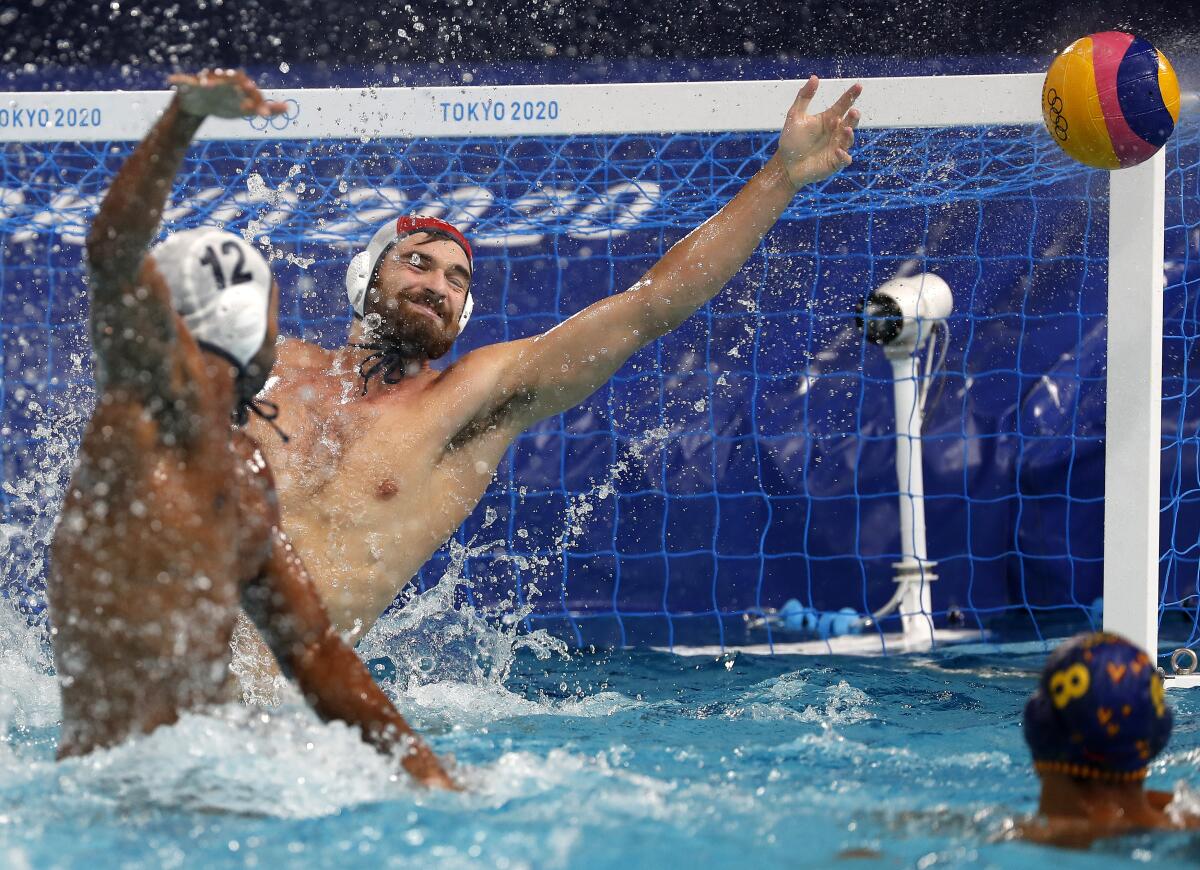
Kevin Baxter on the U.S. men’s water polo team: For the U.S. water polo team, the Tokyo Olympics have been more about mettle than medals.
The U.S. men had their worst Olympic performance in history five years ago in Brazil, finishing 10th in a 12-team field. So Tokyo was about taking the first steps toward rebuilding behind a young team that includes eight first-time Olympians.
So far, the results have been mixed. Although the U.S. advanced out of group play, it lost its quarterfinal Wednesday to Spain, 12-8. It sends the Americans on to a loser’s bracket semifinal Friday against Italy, where a win would guarantee them a spot in the top six, matching their second-best finish in 29 years.
That could also provide some momentum for a team that finished second in the FINA World League last month, matching its best-ever finish in that competition.
Even the losses have become victories of a sort.
Marathon swimming
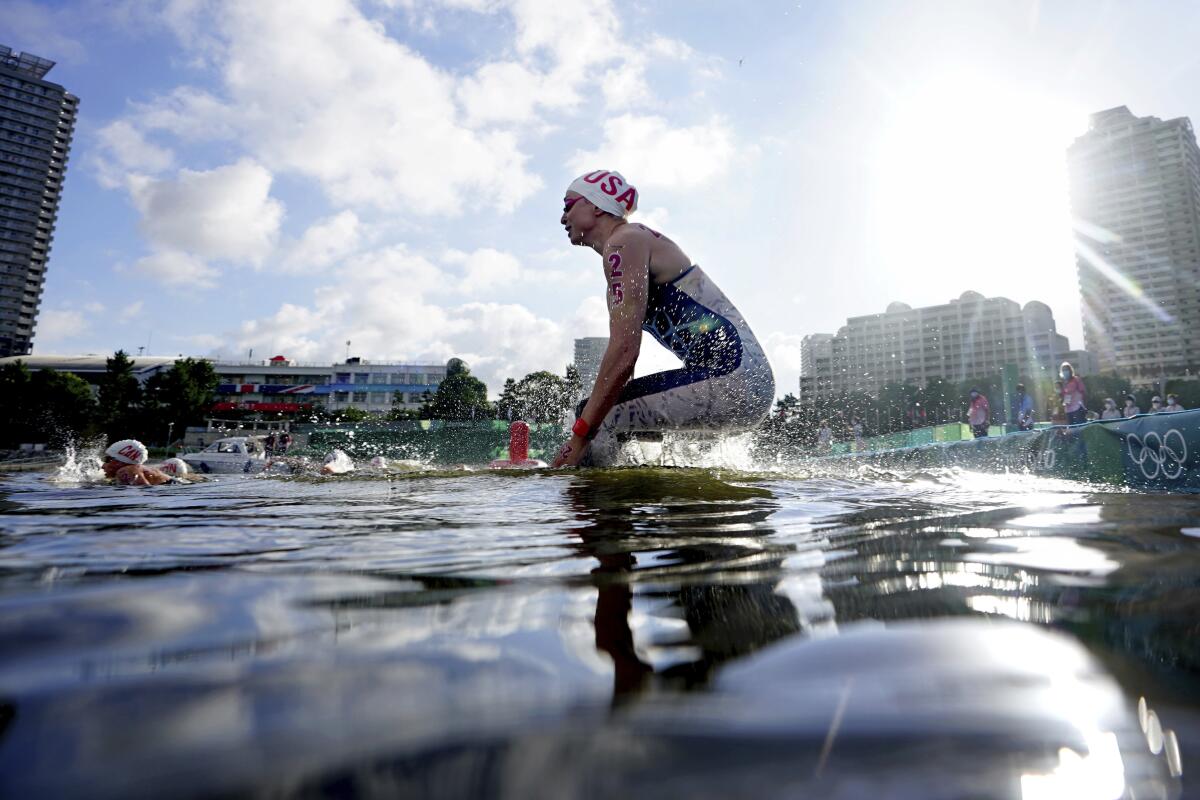
Nathan Fenno on marathon swimming: Murky water laps the shoreline at Odaiba Marine Park in a gentle rhythm, as traffic hums across the Rainbow Bridge in the distance, skyscrapers tower over Tokyo Bay and 48-foot-high Olympic rings float nearby in one of the trademark settings at the Summer Games.
But months of questions followed the 25 women who plunged into the water shortly after dawn Wednesday for the open-water swimming competition.
Under the best of circumstances, the 10-kilometer race is one of the most demanding tests among the 33 sports at the Olympics. For two hours, swimmers navigate seven laps around the course while fighting off competitors — the thrashing pack can become physical without lane lines — gulping occasional drinks extended to the water by long poles and, in the case of one woman, fending off a fish that smacked her in the chest.
This race, however, came after persistent controversy over high water temperatures and pollution raised safety concerns among some athletes and coaches.
“You can always prepare for what you think it’s going to be, but it’s always going to be different,” said Haley Anderson, a USC graduate who lives in Santa Monica and finished sixth. “You never know how hot you’re going to get during a race because 10K is a really long time.”
Sport climbing
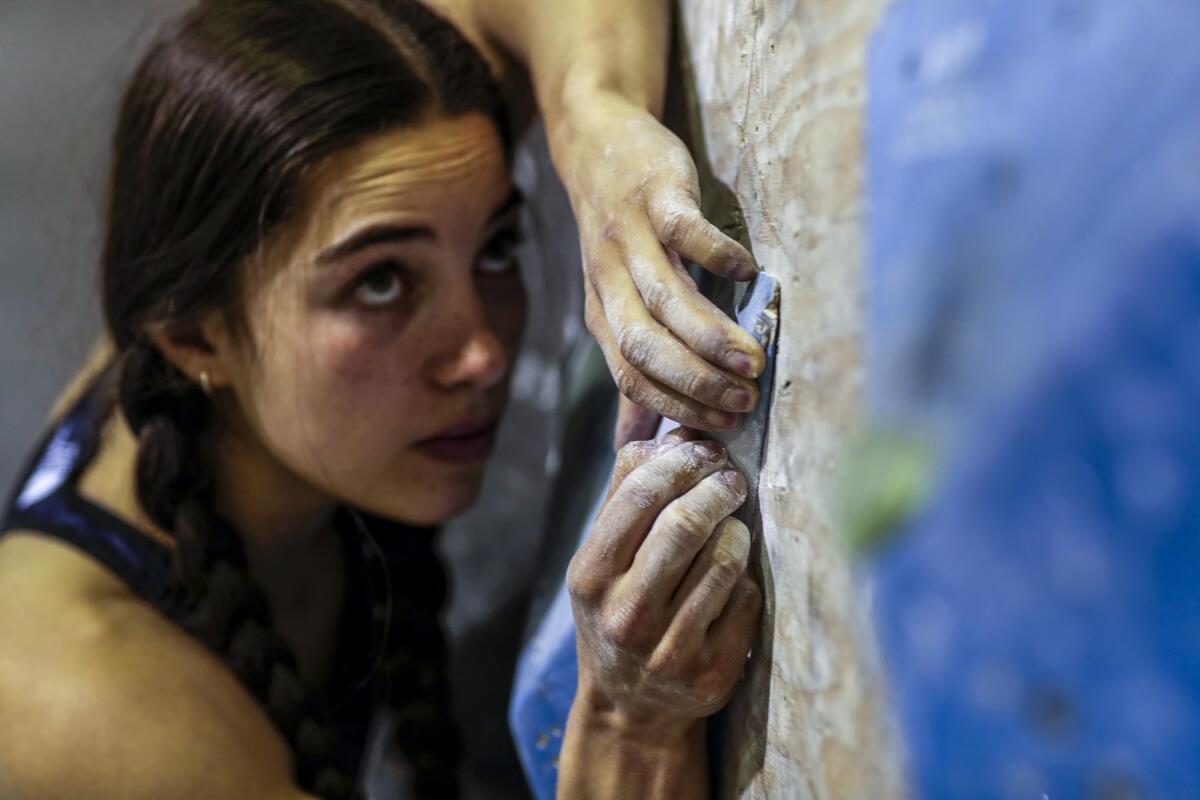
David Wharton on sport climbing: The hands make all the difference.
Small tendons in the fingers must be strengthened and thickened over the course of years, all the better to dangle from a narrow ledge. Nails must be clipped short. Skin must be soft enough to gain traction when reaching for a slight crevice or protrusion, yet durable enough to withstand constant wear and tear.
And calluses. Don’t start climbers talking about their calluses.
“They are, in a sense, our most-prized possession,” Nathaniel Coleman says.
This week, Coleman and his U.S. teammates have come to the Tokyo Olympics for the debut of sport climbing, an event that derives from the age-old challenge of scrambling up cliffs in the wilderness.
Until next time...
That concludes today’s newsletter. If you have any feedback, ideas for improvement or things you’d like to see, email us at sports@latimes.com. To get this newsletter in your inbox, click here.
Go beyond the scoreboard
Get the latest on L.A.'s teams in the daily Sports Report newsletter.
You may occasionally receive promotional content from the Los Angeles Times.




